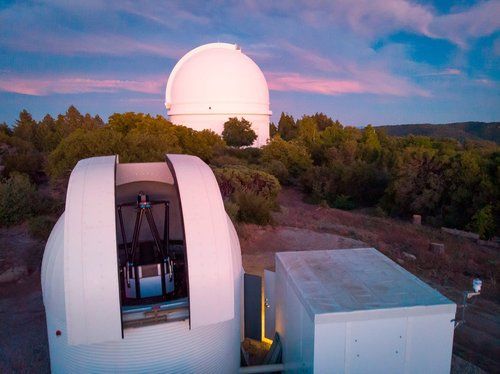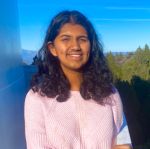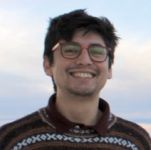ZTF Faces: Summer students and their mentors
 Mallika Sheshadri (Pasadena High School)
Mallika Sheshadri (Pasadena High School)
My name is Mallika Sheshadri and I am currently a 12th grader at Pasadena High School.
This summer, I worked with post-doc Tomás Ahumada and fellow high schooler Sofia Tejada in Prof.
Mansi Kasliwal's lab to create a dataset to train the real-bogus classifier for the WINTER telescope by
crossmatching WINTER alerts to data from other telescopes, particularly ZTF. I've
always loved astronomy, and science in general, but my interest skyrocketed about a year ago when I fell into a Wikipedia rabbit hole on
Lyman-Alpha radiation, which turned into a really fun science fair project! In my free time, I love to read, play music,
and build miniatures.
 Tomas Ahumada (Caltech)
Tomas Ahumada (Caltech)
Tomas Ahumada is currently a Presidential Postdoctoral Fellow at Caltech, working on multi-messenger astronomy.
When he is not searching for gravitational-wave optical counterparts, he hunts for relativistic
explosions associated to high-energy events, such as gamma-ray bursts and X-ray transients, with
the Zwicky Transient Facility and the WINTER telescope.
Creating a Dataset of “Reals” for the WINTER Real-bogus Classifier

The goal of this project was to construct a dataset to train a machine learning model for the WINTER telescope at Mt. Palomar, aimed at determining which sources detected by WINTER are real. This 'real-bogus' algorithm sifts through WINTER data to differentiate between astrophysical objects and artifacts. To build this model, the students crossmatched the entire WINTER database with the Zwicky Transient Facility (ZTF) database, as the ZTF real-bogus algorithm is robust and sources present in both databases are likely real. The final, updated dataset includes a broader sample of sources, allowing for more effective training of the real-bogus algorithm. Each source is assigned a score that can later be used to filter through the vast amounts of data collected by WINTER.
Image: WINTER telescope at the Palomar Observatory. Credit: Matt Dieterich for Caltech
 How do you pick a project to work on?
How do you pick a project to work on?
About a year ago, I reached out to Professor Kasliwal for guidance on an astronomy project I was working on at the
time. She was incredibly helpful and patient, and I really enjoyed and appreciated the time she spent with me. When
I learned that she was planning on having an SRC group this summer, I knew that I wanted to work in her lab, and
I couldn't be happier that I was placed in her group! I am so grateful to have access to such incredible
opportunities even in high school as I explore the world of astronomy and all it has to offer.
 How do you formulate a project for a student?
How do you formulate a project for a student?
When I began my research, I realized that I worked best when I could connect with the project. A key factor is
how relevant the task is to the overall goals, so I shape the project based on its specific needs. For this
particular project, the need for an algorithm to distinguish real sources from a large dataset was a top priority.
 What is the number one quality you look at when you select a mentor to work with?
What is the number one quality you look at when you select a mentor to work with?
I think the best mentors are invested, enthusiastic, kind and patient, and Tomás was just that for Sofia and I this summer! We couldn't have asked for a better mentor.
 What is the number one quality you look at when you select a student to work with?
What is the number one quality you look at when you select a student to work with?
I am very passionate about astronomy, and I look for students who share that same spark. This "spark" can be expressed in various ways, from asking thoughtful questions to going beyond the original task out of curiosity.
 Was there a specific moment during the summer research work that was particularly exciting?
How about challenging?
Was there a specific moment during the summer research work that was particularly exciting?
How about challenging?
There were quite a few! The first was at one of the WINTER meetings when I first realized how important and
useful our project would be to other people using the telescope. I think the most exciting moment was probably when
my code finished running on all of the WINTER data. It felt like a culmination of all the work we did up until then.
One of the more challenging parts was toward the beginning when I was out of town for a week. Even though I
tried to keep working remotely, I felt a bit behind when I returned and had to work really hard to catch up!
 Was there a specific moment during the summer research work that was particularly exciting?
How about challenging?
Was there a specific moment during the summer research work that was particularly exciting?
How about challenging?
I was especially excited at the end of the summer when Mallika successfully implemented everything we had
learned over the weeks and analyzed an entire dataset from one night of WINTER observations. It was promising
to see the breakdown of the sources we were able to recover. As is often the case, the beginning was challenging:
we had to sort through a number of technicalities before we could start working on the actual project.
 What do you think is the most valuable thing you learned this summer?
What do you think is the most valuable thing you learned this summer?
The most valuable thing I learned this summer is how important it is to be passionate about what you're working on.
I had no idea what to expect going into the internship; I had just finished an extremely busy school year, and I
felt pretty tired of learning. When we started, however, I found myself looking forward to working on our project
every day and eager to learn more. That excitement can get lost sometimes, especially in classes, but I've
realized that focusing on that enthusiasm makes everything more fun!
 What do you think is the most valuable thing you learned this summer?
What do you think is the most valuable thing you learned this summer?
As a mentor, I’ve learned there is a balance between helping a student and allowing them to figure things out on their
own. I also realized that sometimes simply listening to the student's needs is enough to spark brainstorming and find solutions.
 In science, answering one question also results in asking oneself a set of new ones. What are
these for you at the end of this project?
In science, answering one question also results in asking oneself a set of new ones. What are
these for you at the end of this project?
Beyond just my project, I had the opportunity to learn more about astronomy in general this summer, and
I have so many questions about new discoveries, projects and technologies. I used to wonder what I, a
high schooler, could possibly accomplish in 6 weeks. Now, I'm curious to know what else is out there,
what more I can learn about, and what I'll accomplish in the future.
 In science, answering one question also results in asking oneself a set of new ones. What are
these for you at the end of this project?
In science, answering one question also results in asking oneself a set of new ones. What are
these for you at the end of this project?
Without even realizing it, I’ve found that the real question now is how to become a better mentor. Different students
have different needs, and through this experience, I’ve discovered various ways to adapt to their styles. Finding the
right balance is certainly part of this, and regardless of the scientific goals achieved, I’ve come to understand
just how important that balance is.
 The universe never fails to surprise us, but did you manage to surprise yourself this summer?
If yes, how?
The universe never fails to surprise us, but did you manage to surprise yourself this summer?
If yes, how?
I think I surprised myself with how excited I became about astronomy. Even though I've always loved learning about space,
it kind of turned into an obsession this summer! I even found myself enjoying coding, something I haven't exactly loved
in the past, because I was working towards a goal that I was really interested in. I found myself constantly reading,
thinking and learning about astronomy; I didn't even know I could be that enthusiastic about an academic subject!